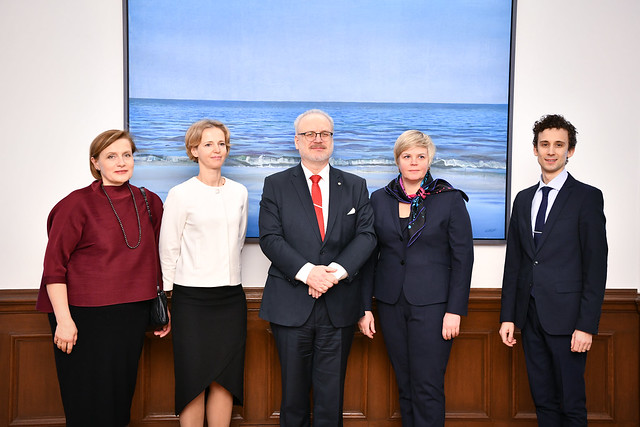Today, President of Latvia Egils Levits met with the President of the Latvian Medical Association Ilze Aizsilniece, President of the Latvian Junior Doctors Association Kārlis Rācenis, President of the Latvian Nurses’ Association Dita Raiska and President of Latvian Association of Midwives Vija Bathena-Krastiņa in the Riga Castle for another round of dialogue with non-governmental sector about current progress of the health reform.
President of the Latvian Medical Association explained how non-governmental health organisations contribute to the health reform working group established by the State Chancellery, including the defining of hospital care levels and full-time equivalent that will make the wage system more transparent for doctors and nurses working at different type and level hospitals. Stakeholders recognised that working group is generally making the right steps and it is clear that the reformed health care system will require additional funding for health care services. Discussion also focused on the need to change the overall attitude towards health care system and its role in the economy, as well as society in terms of giving everyone equal opportunities to be socially active.
President of Latvia praised non-governmental organisations (NGOs) for their active involvement in the healthcare system reform working group. Egils Levits agreed that after the reform healthcare system will need extra funding. Political leaders will have to find the sources of such funding and align funding needs with the rate of economic growth. President and NGOs agreed that it is important to ensure that people pay taxes honestly and contribute to the national budget.
President Levits echoed the words of the President of Latvian Nurses’ Association who underlined the pressing need to support nurses in scope of healthcare wage reform. President Raiska also said that Latvian Nurses’ Association supports the coupling of wage reform with nursing education and greater involvement of nurses in the primary care.
President of the Latvian Junior Doctors Association raised the issue of internships during the meeting. He emphasised that paid internship distorts the situation in the sector and diminishes state’s chances of filling all the vacancies in fields where future doctors have access to paid internships.
Vija Bathena-Krastiņa raised the issue of greater participation of midwives in provision of primary care. She stressed the importance of promoting public health prevention and family well-being. Such promotion is currently limited by contradicting regulatory provisions. Egils Levits and Vija Bathena-Krastiņa agreed that midwives play crucial role in family health and the whole society would benefit from closer cooperation between GP practices and midwives.





